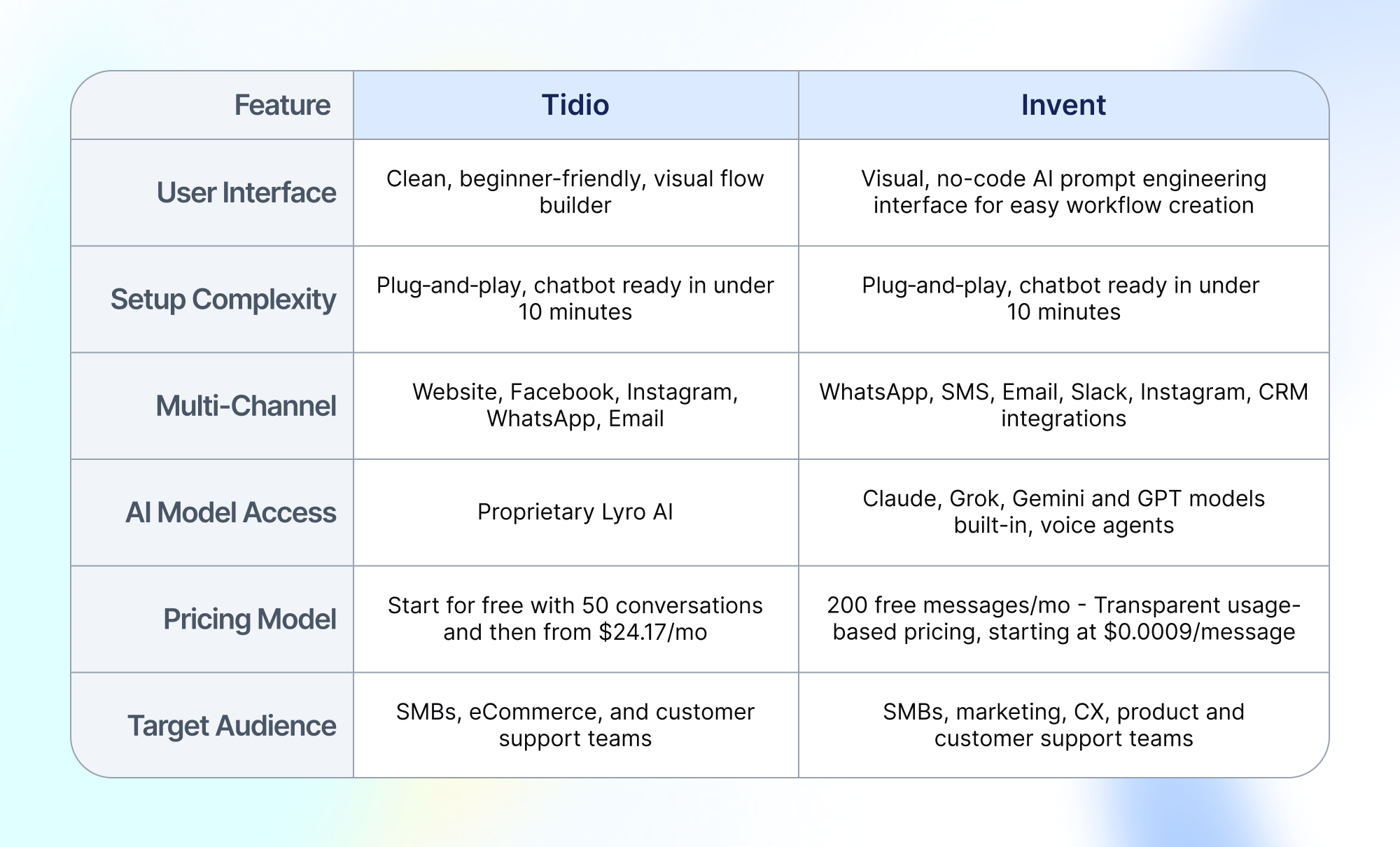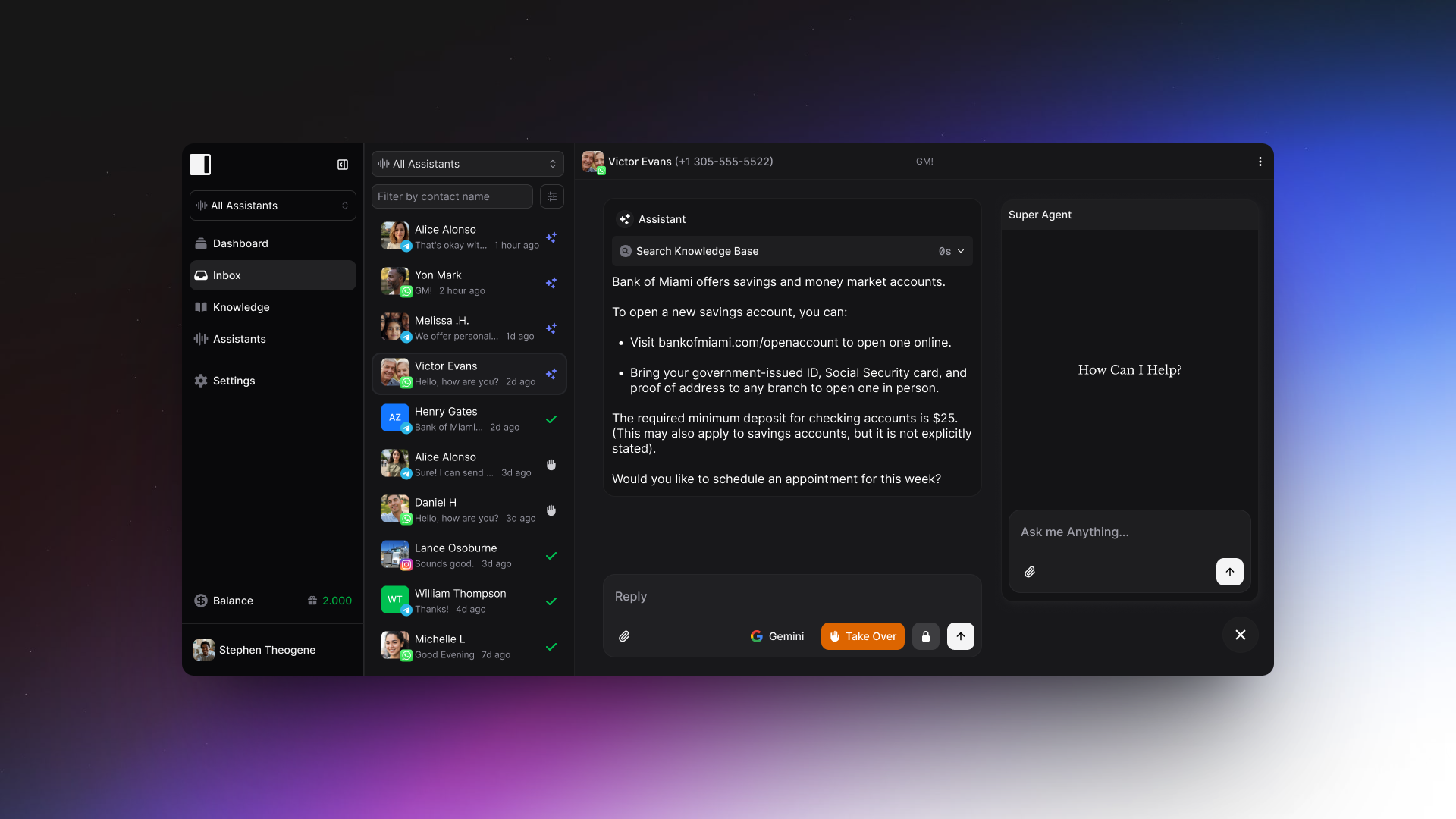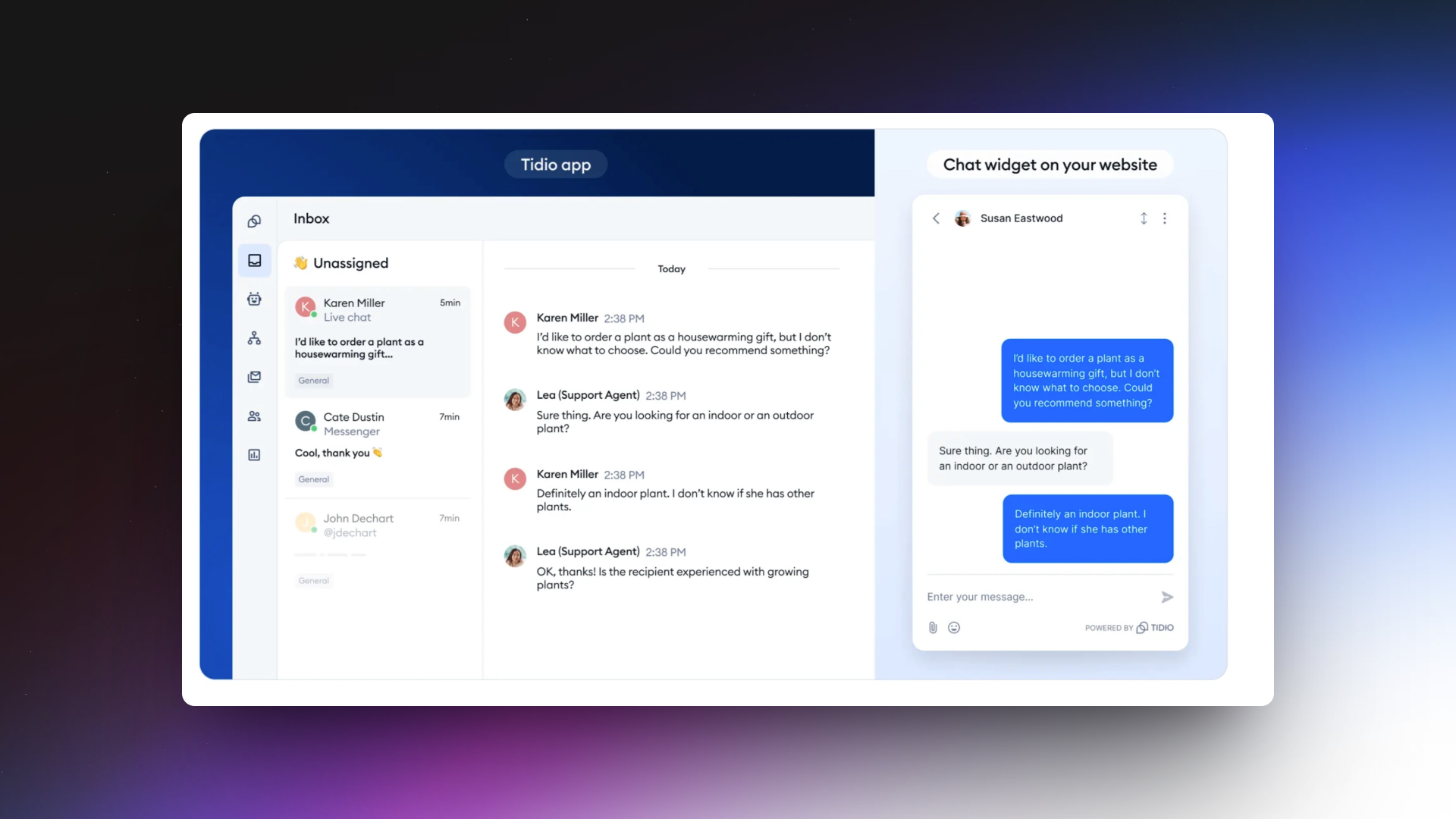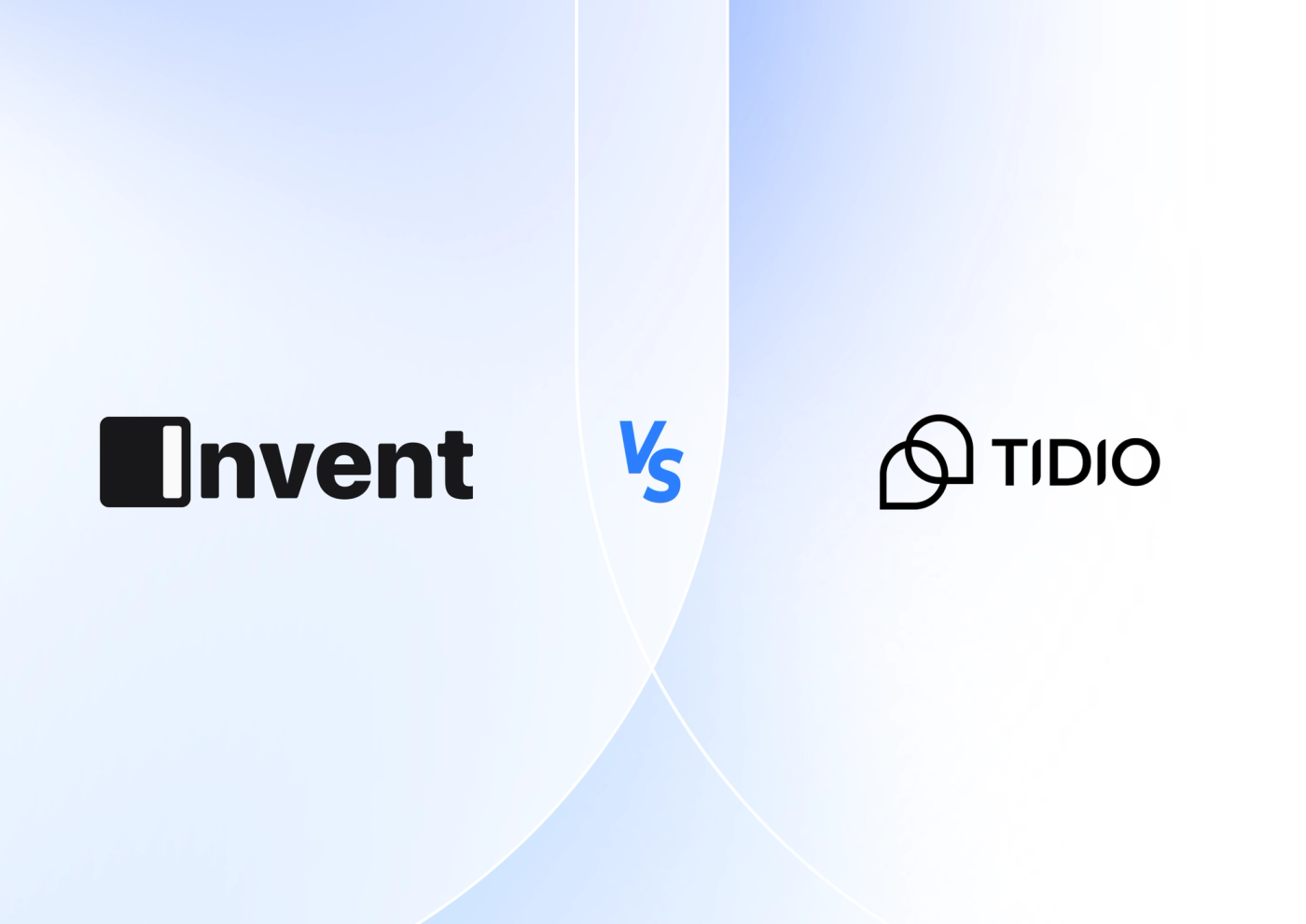TL;DR: Tidio vs Invent
- Invent: Best for product, marketing, and CX teams seeking no-code, rapid multi-channel AI chat automation across WhatsApp, SMS, email, Slack, Instagram, and CRM systems, with transparent, usage-based pricing and direct access to leading LLMs (GPT-4, Claude, Gemini, Grok). Ideal for agile scaling and predictable costs.
- Tidio: Best for small to medium-sized businesses (SMBs) and eCommerce teams automating support and boosting conversions via real-time live chat and AI-powered Lyro chatbots. Known for ease of use, built-in ticketing, shared inbox, and affordable plans combining automation and human support.
Overview
As conversational AI becomes essential to customer engagement, businesses are turning to platforms that unite live support, automation, and personalization under one simple dashboard.
Tidio, a leading customer service platform trusted by brands like Glovo and Jaguar, supports AI chatbots, ticketing, and live chat inside a shared inbox. Its Lyro AI assistant handles up to 70% of customer queries automatically while ensuring accuracy from your knowledge base.
Invent, on the other hand, powers multi-channel automation beyond live chat. It enables product, marketing, and CX teams to launch GPT-4, Claude, Gemini, and Grok–backed AI workflows across WhatsApp, SMS, Instagram, Slack, and email, all from one no-code interface. Invent emphasizes transparency, flexible scalability, and cost control with an open pricing model.
Platform Approaches: Unified automation vs. Fast AI support
Invent’s approach focuses on enabling non-technical teams to build conversational automations visually. Its drag-and-drop interface supports prompt engineering, testing, and deployment across multiple channels, no code or API dependencies required.
Built-in LLM access (GPT-4, Gemini, Claude, Grok) means businesses can design intelligent, multi-modal assistants without juggling providers or contracts.
Tidio’s philosophy centers on quick deployment and smooth live chat-to-AI transitions. Lyro AI as a managed service, instantly pulls data from your FAQ or database to deliver factual responses and reduce ticket load by up to 85%. It’s ideal for small teams wanting to blend automation with live support on websites and social channels. Lyro’s accuracy and multilingual capacity make it reliable for brands needing always-on responsiveness without high complexity.
Core Feature Comparison: Invent vs. Tidio
Here's a comparison table contrasting Tidio and Invent AI automation platforms by user interface, setup complexity, channel support, AI access, pricing, and target audience:

Tidio and Invent comparison highlighting Invent’s multi-model AI access, broader channel integrations, and transparent message-based pricing, making it suitable for varied teams including marketing, CX, product, and support.
Use Cases and best fit analysis
Invent excels for:
- Teams managing multi-channel automation (CRM, WhatsApp, Instagram, SMS, Slack, Email).
- Businesses valuing transparent, usage-based billing and scalability.
- CX leaders desiring unified conversations across platforms.
- Developers and marketers co-creating custom AI assistants using Grok, GPT, Claude, or Gemini models.

A sleek, multi-channel support dashboard from Invent Assistants lets AI and human agents collaborate to serve customers across messaging apps. Unified conversation management, instant knowledge base replies, and easy handoff options create seamless, responsive support experiences.
Tidio is ideal for:
- E-commerce and SMBs needing quick setup for real-time support.
- Brands aiming to cut repetitive inquiries using Lyro AI.
- Businesses with limited technical capacity looking for a ready-to-go customer service platform.
- Help Desk and Live Chat.

This image displays the Tidio customer support dashboard alongside its website chat widget. Agents manage conversations from a unified inbox, while website users interact through a friendly widget UI, ensuring seamless two-way communication. GI
FAQs
Can Invent handle multilingual AI workflows?
Yes. Invent supports English, Spanish, Portuguese, French, and German through integrated LLM capabilities across channels.
Does Tidio include AI automation?
Yes. Tidio’s Lyro AI handles up to 70% of customer queries automatically, leveraging your existing FAQ or knowledge base for factual responses.
Which platform is better for multi-channel messaging?
Invent integrates directly with WhatsApp, SMS, Slack, and Instagram, offering unified orchestration. Tidio focuses primarily on website and live chat interactions.
Is Invent free to start?
Invent offers 200 free messages monthly with transparent usage-based pricing as you scale.
Is Tidio free to start?
Yes. Tidio offers a 50 billable conversations and paid tiers starting at $24.17/mo, and AI-driven add-ons like Lyro ($39/mo).
Which Platform Should You Choose in 2025?
Both Tidio and Invent enhance customer conversation efficiency with automation and AI but cater to distinct audiences.
Tidio is perfect for SMBs and eCommerce brands prioritizing affordability, plug-and-play setup, and real-time chat support.
Invent is designed for growing teams and enterprises that need multi-channel scale, transparent pricing, and flexibility with top-tier LLMs, without technical overhead.
Your choice depends on how broad your automation goals are: if you need instant web chat efficiency, go with Tidio; if you want comprehensive, scalable automation across multiple communication channels, Invent is your best fit. You can dive more about Tidio's and other solutions take a look to this video.
Ready to build your next AI Assistant?
Create one with Invent or explore Tidio’s today to see which platform best supports your team’s 2025 automation goals.







